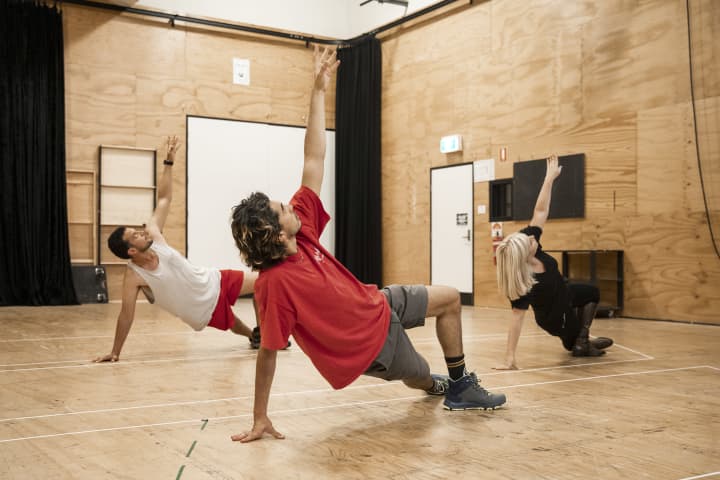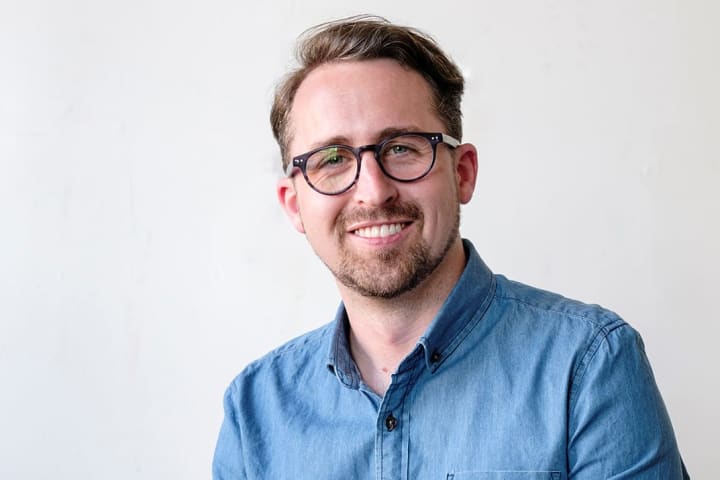Aboriginal and Torres Strait Islander people should be aware that MTC Audio Lab articles and recordings may contain names, imagery and words of deceased persons.
Comprising speeches, texts and poems designed for spoken performance, the oldest work in the collection, Ned Kelly’s letter to Victorian parliamentarian Donald Cameron, dates from 1878; the newest are poems published earlier this year by award-winning Mununjali Yugambeh writer Ellen van Neerven.
Each text dates from a time of change and upheaval, and has been selected for the vision and hope it offers. From political leaders to leading First Nations voices, from outlaw folk heroes to iconic Australian artists, these speeches represent a significant but less widely known part of our cultural and historical conversation.
Inspirational oratory
Explaining her inspiration for the series, Kalive mentions An Evening with John & Elise Curtin, a biographical show she wrote and directed in 2011 about the wartime Prime Minister. ‘What struck me about him in that show was that he was able to rally people and inspire people with his oratory, and with his great delivery. And I was thinking about our leaders today, our politicians speaking at the beginning of this crisis, and how few and far between that great oratory is now.’
Curtin’s address to parliament following Japan’s 1941 attack on Australian allies at Pearl Harbor is one of the 15 texts Kalive has included. His speech was incredibly direct, beginning: “men and women of Australia, we are at war with Japan”. In Greg Stone’s reading of the speech for MTC, you can hear the power of Curtin’s oratory as he laid out his appeal for the cooperation of all Australians in ‘our darkest hour’. The parallels for 2020 are obvious.
‘Listening to leaders from those times was really inspiring. They had a way with words, and they were really clear about why it was important to do what we were doing, and why change was necessary.’
‘I think words spoken by our leaders at times of crisis have a way of being remembered, of living in our psyche in a very particular way,’ she says, acknowledging more recent speeches – Julia Gillard’s sexism speech, Kevin Rudd’s sorry speech and Paul Keating’s Redfern speech among them – as stand-out examples. ‘That’s not so much happening now,’ she notes wryly.
Hence, her delving into the past. ‘Originally I was focusing on two periods of Australia’s history when there was a particular amount of change: the early 1900s and the 1940s. Listening to leaders from those times was really inspiring. They had a way with words, and they were really clear about why it was important to do what we were doing, and why change was necessary. So I thought that at this time, when we don’t have much inspiration and we don’t have a lot of speeches offering us hope, it was important to tune into what our leaders in the past had said in periods of great change, and to know that we would get through it. I was looking for a bit of inspiration, really.’
A particular demographic…
One thing Kalive had in mind from the outset was the dominance of ‘a particular demographic’ in the historical periods she was focusing on: white men. She knew she would have to ‘hunt a bit harder’ to find speeches from women or from people of colour because it was evident ‘that the stories or the speeches of women and BIPOC overwhelmingly weren’t written down.’
Among those Kalive has found and recorded for MTC are Jack Patten’s opening address to the Day of Mourning protest on 26 January 1938, and the maiden speeches from Senator Dorothy Tangney and Dame Enid Lyons, the first two women elected to federal parliament in Australia.

Mark Coles Smith and Izabella Yena in the recording studio. Photo: Brett Walker
For this series, Marg Downey has recorded the Lyons speech, and Izabella Yena Tangney’s speech. Patten’s speech, as read by Mark Coles Smith, is particularly memorable for Kalive. The recording happened just days before the Black Lives Matter protests occurred, proving Patten’s themes still acutely, upsettingly, urgent. ‘He was talking about Indigenous slavery and empowerment and equality, and structural and institutionalised racism. And that was from the 1930s.’
From speech to spoken word
The historical imbalance in recorded words from women and First Nations leaders of the early 20th century was one of the reasons Kalive also decided to delve into poetry and literature of the era, as well as from contemporary authors. So alongside the political and activist speeches mentioned above, she’s also included names such as Miles Franklin and Ellen Van Neerven. ‘I’d already locked onto some poetry from Australia’s earlier history,’ she says, referring to Banjo Patterson’s 1895 classic The Man from Snowy River, ‘and I thought that was naturally quite a nice progression from speeches.’
Especially because ‘poetry is often designed to be spoken, it’s designed to agitate or inspire or to make people feel something. And so, because I had The Man from Snowy River, I thought I could counteract that with some fabulous Indigenous poetry from today. In that we see a very different form in poetry, but equally as impactful and full of imagery and storytelling. So I thought that was a really great way to bookend these great Australian speeches. Because they are written to be spoken.’
Kalive says that choosing the contemporary texts was a collaborative process with actors Shareena Clanton and Leonie Whyman, to find the words that would be most resonant at this time. ‘And that was really exciting, especially because we wouldn’t have got some of the poetry that we now have had it not been for those offers from those performers.’
Hope in the time of Covid
In a similar way, the process of matching actors to speeches became quite organic over time. Kalive had some vague ideas around ‘vocal gravitas’ to begin with, or age aligning of actor to speaker. ‘For example, for some of our older politician speakers I needed somebody with some weathering in their voice. But that kind of got thrown out the window as actors connected with speeches in different ways, and it’s just something that evolved and happened quite by accident sometimes as well. It was kind of alchemical, magical.’
The rehearsal and recording process was very quick, comparatively speaking. It brought with it new challenges, not only in terms of adhering to strict Covid health & safety rules but also an almost experimental creative process. ‘I was kind of freewheeling a little bit and going down my own rabbit holes trying to figure things out. I haven’t had to do that in a long time!’ It was a lonely way of working, but it also forced Kalive to rely on her instinct, which she believes paid off in the end.

Mark Coles Smith, Petra Kalive and Izabella Yena, socially distancing during rehearsals. Photo: Brett Walker
The result, however, is something unique and, she hopes, valuable to the MTC community. Kalive, a long-time consumer of audio drama, believes it aligns well with our primary on-stage theatrical programming. ‘It’s because it’s unpacking an idea or a message or a relationship through storytelling,’ she explains. ‘And it goes to who we are. And there’s something very intimate about that as well.’
Most significantly, in the age of Covid, is that it’s a solo experience. Despite this, Kalive hopes audiences take from these performances similar feelings and experiences they do from staged ones. She hopes ‘they’re swept away in the story or the character or the moment. Or that it makes you think about yourself in the world.’ Mostly, she wants these performances to offer hope. ‘I always try, when I’m making my shows, to get the audience to feel something. And I just hope that they leave these podcasts with that same thing. With the speeches in particular, I was going with hope. Because I think at this time that’s all we can hold on to.’
You can listen to this series and learn more at mtc.com.au/audiolab.
Published on 9 July 2020





